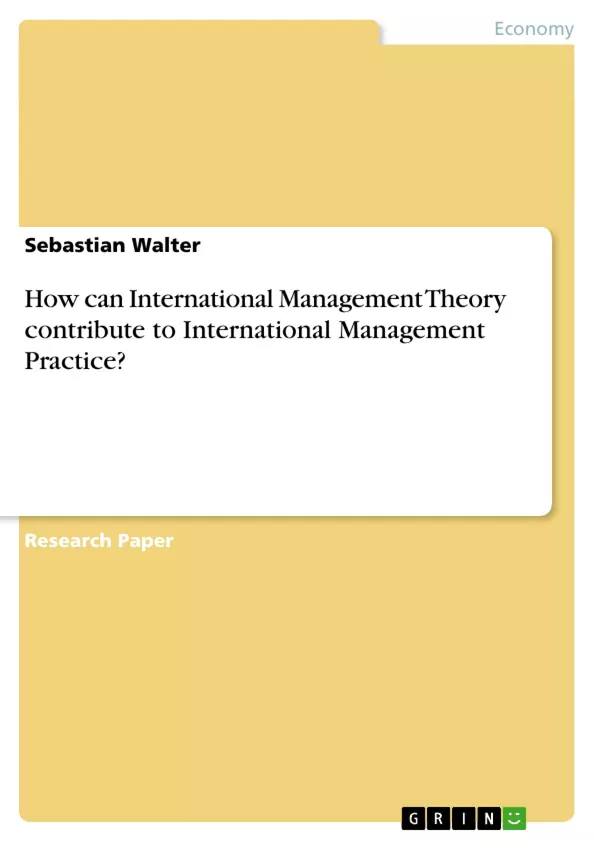Scholars have long noticed a considerable gap between organizational research findings and management practices. Although much has been written about the causes and consequences of this gap, little practicable suggestions have been made to narrow it. This research paper acknowledges the existence of the research-practice gap in general and in the field of International Management (IM) in particular. It views the gap in terms of a knowledge transfer and a knowledge production problem and includes causes specific to the field of International Management. The suggestions provided to narrow the research-practice gap are structured into academic initiatives and practitioner initiatives. Suggestions of academic initiatives refer to the academic publication process, researcher-practitioner interaction, contextualization and context theory. Suggestions of practitioner initiatives refer to implementation issues and the role of practitioners in the establishment of a more collaborative research paradigm.
Inhaltsverzeichnis (Table of Contents)
- Introduction
- The Research-Practice Gap
- Defining the Research-Practice Gap
- Causes of the Research-Practice Gap
- Knowledge Production
- Knowledge Transfer
Zielsetzung und Themenschwerpunkte (Objectives and Key Themes)
This research paper examines the research-practice gap, particularly within the field of International Management (IM). It seeks to understand why research findings often fail to translate into management practice and provides suggestions for bridging this gap. The paper acknowledges the gap as a knowledge production and knowledge transfer problem, identifying causes specific to IM. It proposes solutions through academic initiatives focused on publication processes, researcher-practitioner interaction, and contextualization, and practitioner initiatives regarding implementation issues and a collaborative research paradigm.
- Research-practice gap in International Management
- Knowledge production and transfer problems
- Causes of the research-practice gap in IM
- Suggestions for bridging the gap through academic and practitioner initiatives
- The role of context theory and practitioner-driven research
Zusammenfassung der Kapitel (Chapter Summaries)
Introduction
The introduction highlights the gap between International Management (IM) research and practice, with many practitioners not implementing research findings. The paper aims to answer how IM research can contribute to IM practice by examining causes and offering suggestions for academics and practitioners. It clarifies the meaning of IM within the context of the research, emphasizing the need for context theory and contextualized IM theory.
The Research-Practice Gap
This section defines the research-practice gap, acknowledging its presence not just in IM but across various fields where researchers and practitioners operate separately. The gap is structured as a knowledge production problem (lack of managerial relevance) and a knowledge transfer problem (difficulty in translating research findings for managerial application).
It then delves into the causes of this gap, focusing on knowledge production issues. These include the academic world's emphasis on internal validation, leading to a closed loop where practitioners have limited voice. It also examines the emphasis on rigor over relevance in academic publications, highlighting the potential for a trade-off between academic rigor and practical applicability.
Furthermore, the dominance of quantitative methods in IM research is discussed, questioning its suitability for capturing nuanced cross-cultural phenomena and beliefs. The section concludes with a discussion of knowledge transfer problems, where researchers assume publication in top-tier journals automatically translates into practice, disregarding the challenges of engaging managers and the accessibility of research for non-academic audiences.
Schlüsselwörter (Keywords)
The main keywords and focus topics of this text are: International Management (IM), research-practice gap, knowledge production, knowledge transfer, academic rigor, relevance, quantitative methods, qualitative methods, context theory, practitioner-driven research, evidence-based management (EBM), and the role of practitioners in bridging the research-practice gap.
Frequently Asked Questions
What is the research-practice gap in International Management?
It is the disconnect between scientific findings in organizational research and the actual strategies and actions taken by managers in the field.
Why do practitioners often ignore academic research?
Academic research often prioritizes internal validation and rigor over practical relevance, making findings difficult to apply in real-world business contexts.
What is the knowledge transfer problem?
It refers to the difficulty of translating complex academic theories into accessible and actionable advice that managers can implement.
How can context theory help bridge the gap?
By focusing on specific cultural and organizational contexts, researchers can produce theories that are more relevant to the unique challenges faced by international managers.
What are "academic initiatives" to narrow the gap?
These include changing publication processes, encouraging researcher-practitioner interaction, and emphasizing qualitative methods to capture nuanced phenomena.
- Citation du texte
- Bachelor of Science Sebastian Walter (Auteur), 2009, How can International Management Theory contribute to International Management Practice?, Munich, GRIN Verlag, https://www.grin.com/document/140244



